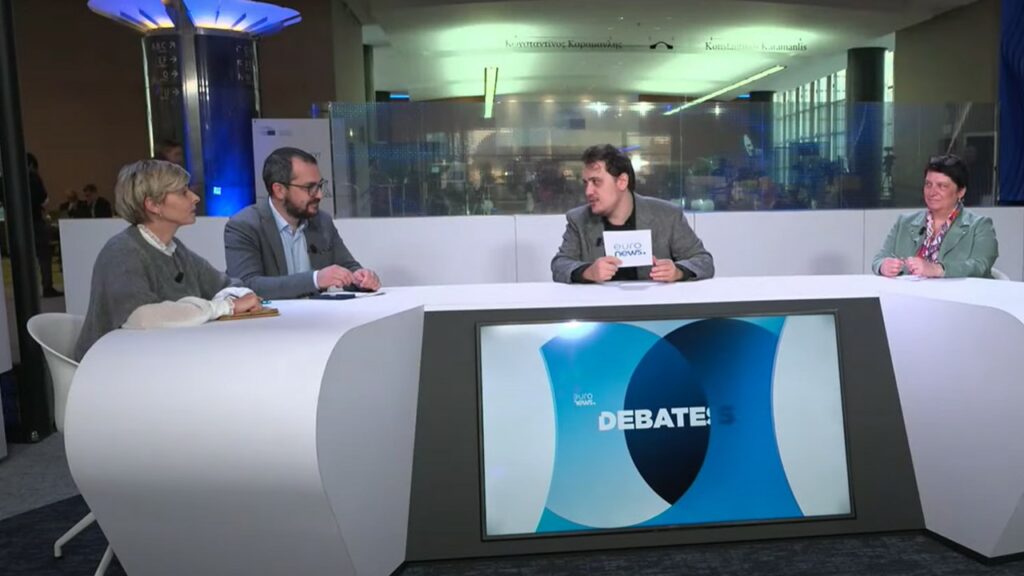The Innovating for Impact: Shaping the Future of Rare Disease Treatment event, hosted by Euronews and organised by Rare Disease Moonshot, brought together key figures in rare disease advocacy to discuss the future of treatment in Europe.
Moderated by Gerardo Fortuna, EU policy reporter for Euronews, the panel included Vlad Voiculescu (MEP, Renew Europe, European Parliament), Graham Slater (Board of Directors, EURORDIS), Daria Julkowska (Assistant Director, INSERM and Scientific Coordinator of ERDERA), and Magda Chlebus (Executive Director, Scientific & Regulatory Affairs, EFPIA).
A Paradigm Shift in Rare Disease Research
Daria Julkowska, ERDERA’s scientific coordinator, highlighted the urgent need for a “paradigm shift” in rare disease research. She explained, “A paradigm shift in scientific research means thinking about rare diseases differently—grouping them, so we tackle more than one at a time.” Adopting this approach could make research more efficient by addressing diseases that share common traits, rather than treating each one individually. Julkowska stressed the importance o
Beyond scientific and operational changes, Julkowska emphasised the importance of regulatory frameworks that are flexible enough to address the unique challenges of rare disease research. “For rare disease research to advance, regulatory systems must evolve to support innovative and risk-driven projects,” she stated, noting that this shift is essential to make meaningful progress in treatment development.
Vlad Voiculescu, MEP and a long-time advocate for patient access, echoed Julkowska’s call for addressing unmet medical needs. “In terms of unmet medical needs, you can discuss everything from medicines to surgeries that are not available in many countries,” Voiculescu remarked, underscoring the disparities in access to care across Europe. He called for cooperation across borders and between institutions to ensure treatments reach all patients, regardless of where they live, and emphasised the need to develop medicines for rarer and less profitable conditions.
The Role of Public-Private Partnerships
Julkowska underscored the fact that ERDERA brings together over 170 entities, including patient advocacy groups, academic researchers, and pharmaceutical companies, to collectively address rare disease challenges. “We are building a robust network of stakeholders to tackle complex medical challenges,” she noted, stressing that the rare disease ecosystem relies on diverse collaborations to drive progress.
Magda Chlebus, representing EFPIA, further elaborated on the importance of strategic public-private partnerships, advocating for a model that goes beyond mere funding alliances. “We are talking about the partnerships where you bring researchers from private and public sectors, patients, healthcare systems, and regulators, sitting around the table, defining what the problem is and then working towards achieving the solution,” Chlebus explained. She underlined how each stakeholder brings unique elements to the table, and only by combining these resources can rare disease research advance more rapidly.
Adding to the discussion on collaborative approaches, Graham Slater of EURORDIS highlighted the necessity of involving all stakeholders from the outset. “If you don’t bring the stakeholders in at the beginning, you may get resistance later and certainly won’t get optimal solutions,” Slater said. His perspective reinforced the need for early, comprehensive engagement among researchers, policymakers, and patient groups to create cohesive and effective treatment pathways.
The panel collectively highlighted the fragmentation of rare disease research funding across Europe, noting a gap in support as projects move into the hands of SMEs. Julkowska called for stronger public-private partnerships to bridge this gap, stressing ERDERA’s role as a unifying force to streamline funding and resources for innovative projects. ERDERA seeks to create a cohesive framework where public, private, and academic sectors can collaborate effectively, ensuring that promising research receives sustained support as it advances through development stages.

